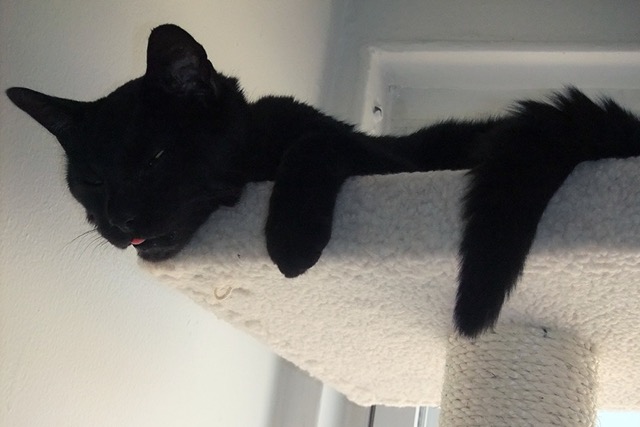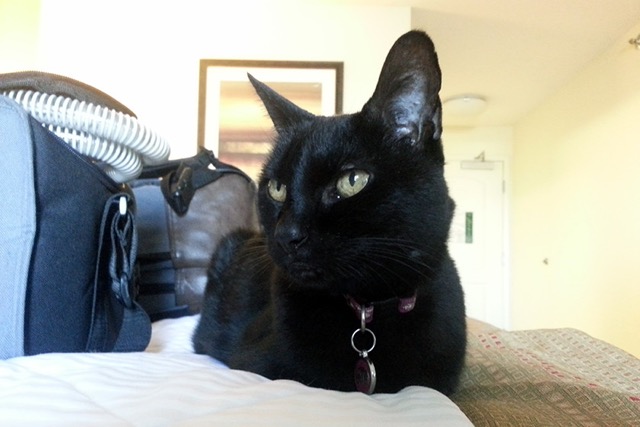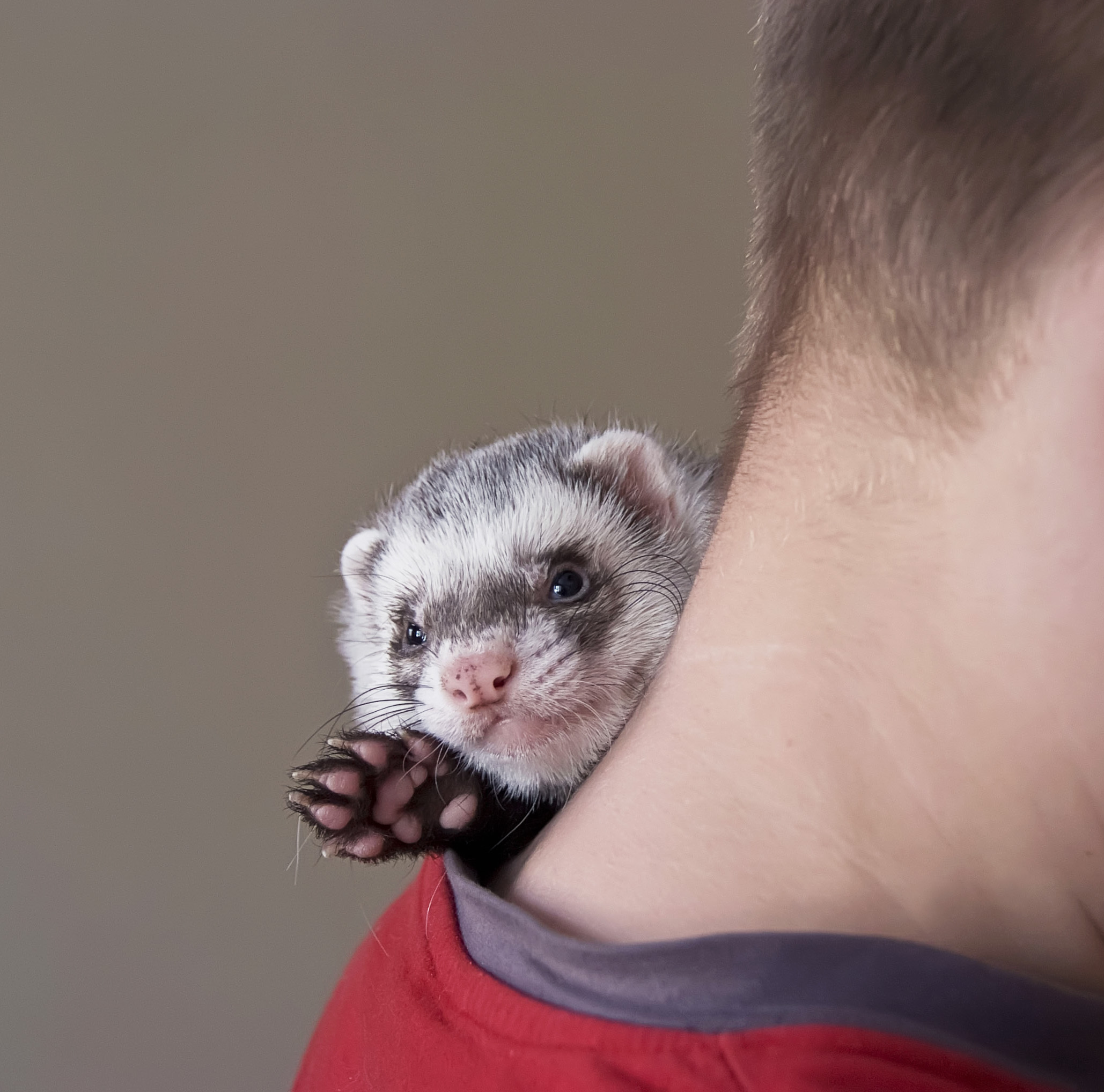The Five Cs of Senior Cat Care
Guest post by JaneA Kelley
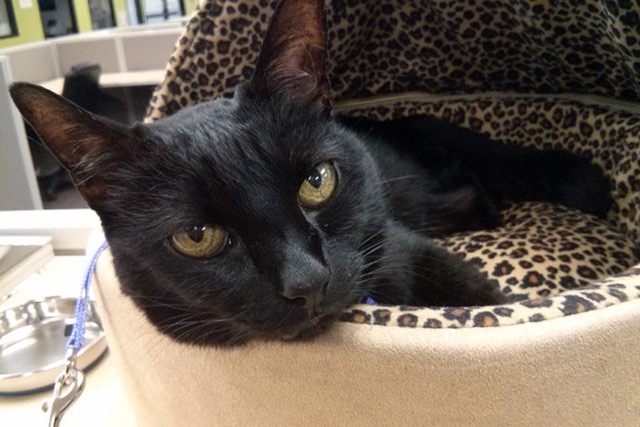 As our feline friends age, they need us to understand and accommodate their special needs.
As our feline friends age, they need us to understand and accommodate their special needs.
I’m lucky to have known quite a few cats who survived well into their teens. My Siouxsie, lived to be almost 19 – about 96 in human years – and she enjoyed a good quality of life right up until the end because I did these five things, now onto my five Cs of senior cat care:
Cut her some slack: As your cat ages, she may start doing things that annoy you. She might get more vocal, start peeing outside the box, or become very picky about the food she eats. She’s not doing these things to spite you, and some of these behaviors can actually be signs of disease. A change in your cat’s behavior is often the only warning sign you’ll have that something is wrong with your cat, so instead of getting annoyed with her, get her to the vet.
Cater to her new needs. A cat’s body changes as she ages, just like ours do. If your kitty enjoys high places but she seems reluctant to jump or climb, consider getting or making some steps to help her reach her favorite places. Senior cats sometimes have trouble stepping into and out of high-sided litter boxes, so invest in a low-sided box or give her a little ramp to help her get into the litter tray.
Speaking of litter boxes, add a couple of extras in rooms where your cat likes to lounge so that if she gets that “gotta go right now” feeling, she can get to an appropriate place rather than having an accident on the floor.
Check up regularly on her health. Your senior cat should have a complete physical, including a blood panel and urinalysis, at least every six months – more often if she has a chronic condition like kidney disease or hyperthyroidism. Blood tests can reveal illnesses before they become obvious, which will make treating and managing those illnesses much more successful.
When Siouxsie’s blood work revealed that she had early stage kidney disease, I got a pet fountain to keep her hydrated and my vet gave me potassium powder to add to her food. Those two interventions kept her kidney function stable until the day she died. Had I not had those blood tests done, I might not have realized she had kidney problems until she ended up at the vet extremely sick and with a poor prognosis.
Control her pain. If your cat is grouchy and cranky, or if she hisses when you touch her in certain places, the odds are very good that she’s in pain. But even if she never gives you a clue, that doesn’t mean she’s not hurting. Cats get arthritis. They get dental pain. Diseases like pancreatitis and cancer are painful, too.
It used to be that there weren’t many good options for pain management in cats, since NSAIDs are toxic to your feline friend, but that’s changing. I managed Siouxsie’s arthritis with a medical cannabis supplement until her pain got severe enough that I switched her to buprenoprhine, an opiate. If your cat doesn’t like to take pills, fear not: many medications can be compounded into tasty liquids that are easy to give.
Cherish every moment. When you know you and your cat are going to have fewer tomorrows together than yesterdays, it becomes more important each day to be present with them. I’m not talking being physically in the home with your cat, but being emotionally present when you are with her. Some people tend to “check out” because the idea of losing a beloved friend can be terrifying, but your elder kitty needs you now more than she ever has. Living with an aging cat is a great opportunity to practice compassion, both with your cat and with yourself. Since my Siouxsie died, I’m grateful for every memory and every moment, even the ones that drove me crazy.
Do you have a senior cat? What other tips would you give people with aging kitties? Please share your ideas, and your stories of your elder cats in the comments.
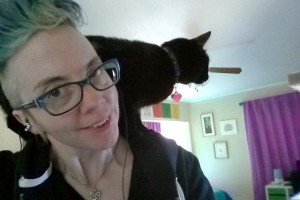 JaneA Kelley is the webmaster and chief cat slave of the award-winning blog, Paws and Effect. She is a contributing author for the print and online versions of Catster Magazine, and serves as the secretary and social media manager for Diabetic Cats in Need, a nonprofit dedicated to helping people care for their diabetic cats.
JaneA Kelley is the webmaster and chief cat slave of the award-winning blog, Paws and Effect. She is a contributing author for the print and online versions of Catster Magazine, and serves as the secretary and social media manager for Diabetic Cats in Need, a nonprofit dedicated to helping people care for their diabetic cats.
Photo captions: JaneA and Siouxsie: Siouxsie wasn’t as good at climbing in her later years, but she still enjoyed her shoulder rides; Doped up after dental: Siouxsie came home from her first dental with four fewer teeth and a good load of pain meds on board; Heated bed: The best thing I ever bought for Siouxsie was this heated bed. She loved the warmth, and it helped her to feel less achy; Hotel room: Siouxsie was a great traveler, and she proved it lots of times in our cross-country move.

